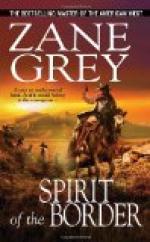The hurried consultation over, Silvertip tied Joe’s horse and dog to the trees, and once more led the way; this time he avoided the open forest and kept on low ground. For a long time he traveled in the bed of the brook, wading when the water was shallow, and always stepping where there was the least possibility of leaving a footprint. Not a word was spoken. If either of the brothers made the lightest splash in the water, or tumbled a stone into the brook, the Indian behind rapped him on the head with a tomahawk handle.
At certain places, indicated by the care which Silvertip exercised in walking, the Indian in front of the captives turned and pointed where they were to step. They were hiding the trail. Silvertip hurried them over the stony places; went more slowly through the water, and picked his way carefully over the soft ground it became necessary to cross. At times he stopped, remaining motionless many seconds.
This vigilance continued all the afternoon. The sun sank; twilight spread its gray mantle, and soon black night enveloped the forest. The Indians halted, but made no fire; they sat close together on a stony ridge, silent and watchful.
Joe pondered deeply over this behavior. Did the Shawnees fear pursuit? What had that Indian chief told Silvertip? To Joe it seemed that they acted as if believing foes were on all sides. Though they hid their tracks, it was, apparently, not the fear of pursuit alone which made them cautious.
Joe reviewed the afternoon’s march and dwelt upon the possible meaning of the cat-like steps, the careful brushing aside of branches, the roving eyes, suspicious and gloomy, the eager watchfulness of the advance as well as to the rear, and always the strained effort to listen, all of which gave him the impression of some grave, unseen danger.
And now as he lay on the hard ground, nearly exhausted by the long march and suffering from the throbbing wound, his courage lessened somewhat, and he shivered with dread. The quiet and gloom of the forest; these fierce, wild creatures, free in the heart of their own wilderness yet menaced by a foe, and that strange French phrase which kept recurring in his mind—all had the effect of conjuring up giant shadows in Joe’s fanciful mind. During all his life, until this moment, he had never feared anything; now he was afraid of the darkness. The spectral trees spread long arms overhead, and phantom forms stalked abroad; somewhere out in that dense gloom stirred this mysterious foe—the “Wind of Death.”
Nevertheless, he finally slept. In the dull-gray light of early morning the Indians once more took up the line of march toward the west. They marched all that day, and at dark halted to eat and rest. Silvertip and another Indian stood watch.
Some time before morning Joe suddenly awoke. The night was dark, yet it was lighter than when he had fallen asleep. A pale, crescent moon shown dimly through the murky clouds. There was neither movement of the air nor the chirp of an insect. Absolute silence prevailed.




